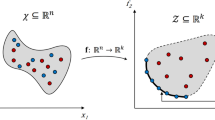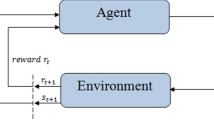Abstract
This note considers the single-machine total weighted tardiness problem. Three new heuristic algorithms are suggested and compared with other competing heuristics from the literature, such as Apparent Tardiness Cost, Weighted Covert and Weighted Modified Due Date. The experimental tests show that the suggested heuristic algorithms outperform the existing heuristics.
Similar content being viewed by others
References
Abdul-Razaq TS, Potts CN and van Wassenhove LN (1990). A survey of algorithms for the single machine total weighted tardiness scheduling problem . Discrete Appl Math 26: 235–253.
Adler LN, Fraiman M, Kobacker E, Pinedo M and Plotnitcoff JC (1993). Wu TP. BPSS: A scheduling system for the packaging industry . Opns Res 41: 641–648.
Avci S, Akturk MS and Storer RH (2003). A problem space algorithm for single machine weighted tardiness problems . IIE T 35: 479–486.
Baker KR and Bertrand MB (1983). A dynamic priority rule for scheduling against due-dates . J Opns Mngt 3: 37–42.
Crauwels HAJ, Potts CN and van Wassenhove LN (1998). Local search heuristics for the single machine total weighted tardiness scheduling problem . Informs J Comput 10: 341–350.
Emmons H (1969). One-machine sequencing to minimize certain functions of job tardiness . Opns Res 17: 701–705.
Huegler PA and Vasko FJ (1997). A performance comparison of heuristics for the total weighted tardiness problem . Comput IE 32: 753–767.
Kanet JJ and Li X (2004). A weighted modified due date rule for sequencing to minimize weighted tardiness . J Sched 7: 261–276.
Koulamas CP (1994). The total tardiness scheduling problem: Review and extensions . Opns Research 42: 1025–1041.
Lenstra JK, Rinnoy Kan AHG and Brucker P (1977). Complexity of machine scheduling problems . Ann Discrete Math 1: 343–362.
Mason SJ, Fowler JW and Carlyle WM (2002). A modified shifting bottleneck heuristic for minimizing total weighted tardiness in complex job shops . J Sched 5: 247–262.
Morton TE and Pentico DW (1993). Heuristic Scheduling Systems with Applications to Production and Project Management . John Wiley & Sons: New York.
Morton TE, Rachamadugu, RM and Vepsalainen A (1984). Accurate myopic heuristics for tardiness scheduling. GSIA technical report, Carnegie-Mellon University.
Potts CN and van Wassenhove LN (1991). Single machine tardiness sequencing heuristics . IIE Trans 23: 346–354.
Sen T, Sulek JM and Dileepan P (2003). Static scheduling research to minimize weighted and unweighted tardiness: A state-of-the-art survey . Int J Prod Econ 83: 1–12.
Vepsalainen AP and Morton TE (1987). Priority rules for job shops with weighted tardiness costs . Mngt Sci 33: 1035–1047.
Volgenant A and Teerhuis E (1999). Improved heuristics for the n-job single-machine weighted tardiness problem . Comput Opns Res 26: 35–44.
Acknowledgements
This study was supported by research funds from Dong-A University.
Author information
Authors and Affiliations
Corresponding author
Rights and permissions
About this article
Cite this article
Yoon, S., Lee, I. New constructive heuristics for the total weighted tardiness problem. J Oper Res Soc 62, 232–237 (2011). https://doi.org/10.1057/jors.2009.186
Received:
Accepted:
Published:
Issue Date:
DOI: https://doi.org/10.1057/jors.2009.186




